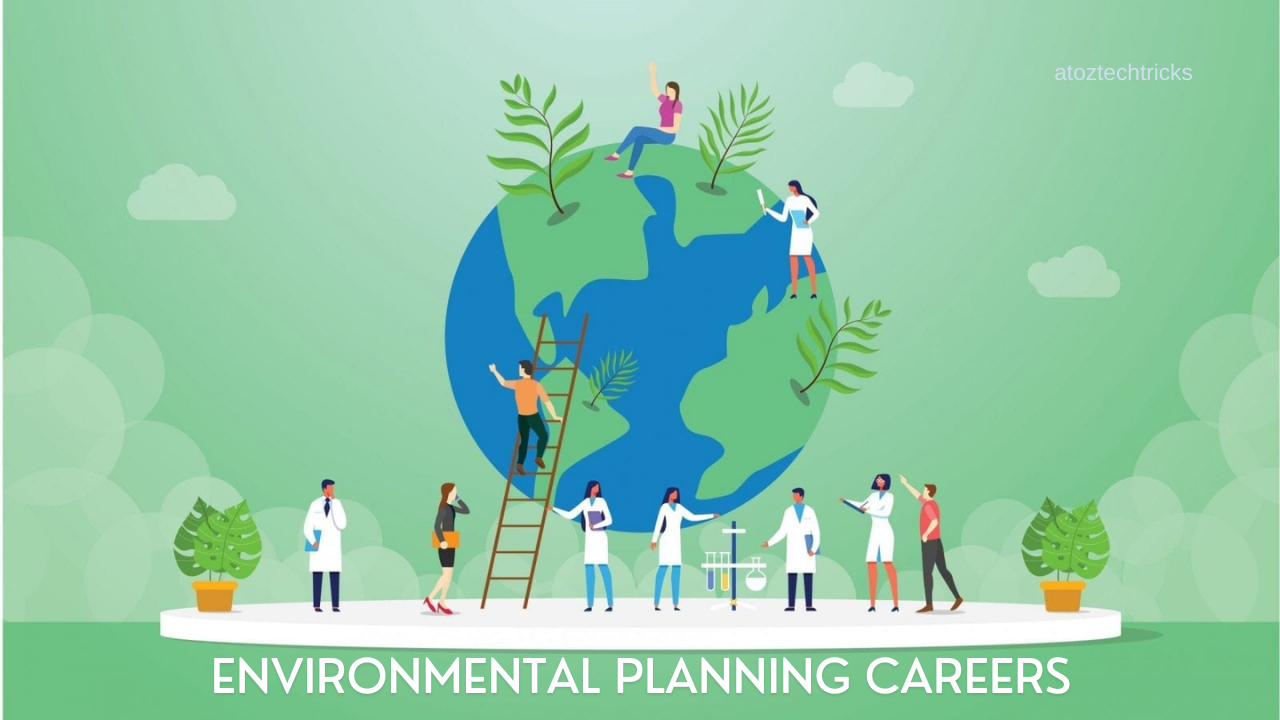Environmental Planning Careers: A Comprehensive Guide
In today’s world, environmental concerns are more prominent than ever. Climate change, habitat destruction, pollution, and resource depletion are pressing issues that require thoughtful planning and management. Environmental planning careers are crucial in addressing these challenges and shaping a sustainable future. This comprehensive guide explores various careers in environmental planning, their roles, responsibilities, and the skills required to excel in this field.
What is Environmental Planning?
Environmental planning is a multidisciplinary field that focuses on the management and mitigation of human impacts on the environment. It involves developing strategies and policies to ensure sustainable land use, protect natural resources, and enhance environmental quality. Environmental planners work with various stakeholders, including government agencies, non-profit organizations, businesses, and communities, to create and implement plans that balance ecological health with human development needs.
Why Choose a Career in Environmental Planning?
The growing emphasis on environmental sustainability and climate action makes environmental planning a vital and rewarding career choice. Here are some reasons to consider:
- Addressing Global Challenges: Environmental planners play a crucial role in combating climate change, protecting ecosystems, and promoting sustainable development.
- Diverse Career Opportunities: The field offers a range of career paths, from policy development to fieldwork, allowing professionals to specialize in areas that align with their interests.
- Impactful Work: Careers in environmental planning provide opportunities to make a tangible difference in preserving natural resources and improving community well-being.
- Interdisciplinary Approach: The field combines knowledge from various disciplines, including ecology, geography, economics, and social sciences, making it intellectually stimulating.

Career Paths in Environmental Planning
- Environmental Planner
Role and Responsibilities: Environmental planners develop and implement plans to manage land use and natural resources. They assess the environmental impacts of proposed projects, prepare reports, and recommend strategies to mitigate negative effects. Their work involves collaborating with stakeholders, analyzing data, and ensuring compliance with environmental regulations.
Skills Required:
- Strong analytical and problem-solving abilities
- Knowledge of environmental regulations and policies
- Excellent communication and interpersonal skills
- Proficiency in geographic information systems (GIS) and data analysis tools
Educational Requirements: A bachelor’s degree in environmental science, urban planning, geography, or a related field is typically required. Advanced positions may require a master’s degree in environmental planning or a related discipline.
- Environmental Consultant
Role and Responsibilities: Environmental consultants provide expertise to organizations and government agencies on environmental issues. They conduct assessments, prepare environmental impact statements, and offer recommendations for compliance and improvement. Consultants often specialize in areas such as pollution control, waste management, or ecological restoration.
Skills Required:
- Strong research and analytical skills
- Ability to interpret environmental regulations and standards
- Excellent report writing and presentation skills
- Project management capabilities
Educational Requirements: A bachelor’s degree in environmental science, engineering, or a related field is essential. Many consultants also hold advanced degrees and relevant certifications.
- Environmental Policy Analyst
Role and Responsibilities: Environmental policy analysts research and evaluate environmental policies and programs. They analyze data, assess policy effectiveness, and provide recommendations for policy improvements. Their work often involves collaborating with legislators, advocacy groups, and community organizations to shape environmental policies.
Skills Required:
- Strong research and analytical skills
- Ability to understand and interpret policy documents
- Excellent writing and communication skills
- Knowledge of environmental and public policy
Educational Requirements: A bachelor’s degree in environmental policy, public administration, or a related field is required. A master’s degree or higher in public policy or environmental management is often preferred.
- Environmental Impact Assessor
Role and Responsibilities: Environmental impact assessors evaluate the potential effects of projects on the environment. They conduct field surveys, analyze environmental data, and prepare impact assessment reports. Their goal is to identify potential environmental risks and recommend mitigation measures.
Skills Required:
- Expertise in environmental science and impact assessment methodologies
- Strong analytical and fieldwork skills
- Ability to prepare detailed reports and communicate findings
- Proficiency in data collection and analysis
Educational Requirements: A bachelor’s degree in environmental science, biology, or a related field is essential. Some positions may require advanced degrees or specialized certifications.
- Sustainability Manager
Role and Responsibilities: Sustainability managers oversee the implementation of sustainable practices within organizations. They develop sustainability strategies, monitor progress, and ensure compliance with environmental regulations. Their work involves promoting resource efficiency, reducing waste, and enhancing corporate social responsibility.
Skills Required:
- Strong organizational and project management skills
- Knowledge of sustainability practices and standards
- Excellent communication and leadership abilities
- Ability to analyze and report on sustainability metrics
Educational Requirements: A bachelor’s degree in environmental science, sustainability, business management, or a related field is required. Advanced positions may require a master’s degree in sustainability management or a related discipline.
- Environmental Educator
Role and Responsibilities: Environmental educators develop and deliver educational programs on environmental issues. They work with schools, community groups, and organizations to raise awareness about environmental conservation and sustainability. Their role involves creating educational materials, conducting workshops, and engaging with diverse audiences.
Skills Required:
- Strong communication and teaching skills
- Ability to create engaging educational content
- Knowledge of environmental issues and educational methodologies
- Experience in public speaking and community outreach
Educational Requirements: A bachelor’s degree in environmental education, science education, or a related field is typically required. Advanced degrees may be preferred for specialized roles.
Environmental Policy Careers: Navigating the Path to a Sustainable Future
Skills and Qualifications for Environmental Planning Careers
Regardless of the specific career path, professionals in environmental planning generally require a combination of technical, analytical, and interpersonal skills. Here are some key qualifications:
- Technical Skills: Proficiency in GIS, data analysis software, and environmental modelling tools is essential for many environmental planning roles. Technical skills enable professionals to analyze environmental data, create maps, and develop planning models.
- Analytical Skills: Strong analytical abilities are crucial for evaluating environmental data, assessing impacts, and developing effective planning strategies. Environmental planners must be able to interpret complex information and make informed decisions.
- Communication Skills: Effective communication is vital for collaborating with stakeholders, preparing reports, and presenting findings. Environmental planners must be able to convey technical information clearly and persuasively to diverse audiences.
- Project Management: Many environmental planning roles involve managing projects, from research and assessments to policy development and implementation. Project management skills help professionals coordinate tasks, meet deadlines, and manage budgets.
- Knowledge of Environmental Regulations: Understanding environmental laws, regulations, and policies is crucial for ensuring compliance and developing effective plans. Professionals must stay updated on changing regulations and industry standards.

Career Outlook and Opportunities
The demand for environmental planning professionals is expected to grow as environmental issues become increasingly pressing. According to the U.S. Bureau of Labor Statistics (BLS), employment in environmental science and protection roles is projected to grow faster than the average for all occupations. Factors contributing to this growth include heightened awareness of environmental issues, increased regulatory requirements, and the need for sustainable development.
Challenges in Environmental Planning Careers
While rewarding, careers in environmental planning come with challenges:
- Complexity of Issues: Environmental planning involves addressing complex and often conflicting issues, such as balancing development with conservation. Professionals must navigate intricate problems and find solutions that meet diverse needs.
- Regulatory and Policy Changes: Environmental regulations and policies frequently change, requiring professionals to stay informed and adapt their strategies accordingly. This dynamic environment can pose challenges in maintaining compliance and implementing effective plans.
- Stakeholder Conflicts: Environmental planning often involves working with various stakeholders who may have differing interests and priorities. Navigating these conflicts and finding common ground can be challenging.
- Funding and Resources: Securing funding and resources for environmental projects can be difficult. Professionals may need to seek grants, collaborate with funding organizations, or manage limited resources effectively.
Engineering Careers: Exploring Opportunities and Pathways in a Dynamic Field
How to Prepare for a Career in Environmental Planning
- Education: Obtain a relevant degree in environmental science, urban planning, geography, or a related field. Consider pursuing advanced degrees or certifications for specialized roles.
- Experience: Gain practical experience through internships, volunteer work, or entry-level positions in environmental planning or related fields. Hands-on experience is invaluable for building skills and understanding the field.
- Networking: Connect with professionals in the field through conferences, professional organizations, and networking events. Building a professional network can provide valuable insights, mentorship, and job opportunities.
- Stay Informed: Keep up-to-date with the latest developments in environmental regulations, technologies, and planning practices. Continuing education and professional development are essential for staying current in the field.
- Develop Skills: Focus on building skills in GIS, data analysis, project management, and communication. These skills are highly valued in environmental planning careers and can enhance job performance and career prospects.
Environmental planning careers offer diverse and impactful opportunities for individuals passionate about sustainability and environmental stewardship. From developing land use strategies to implementing sustainability initiatives, professionals in this field play a critical role in addressing global environmental challenges. By acquiring the necessary skills, gaining practical experience, and staying informed, aspiring environmental planners can build rewarding careers that contribute to a sustainable future. As the world continues to face environmental challenges, the demand for skilled environmental planners is likely to grow, offering exciting opportunities for those committed to making a positive difference.





Post Comment